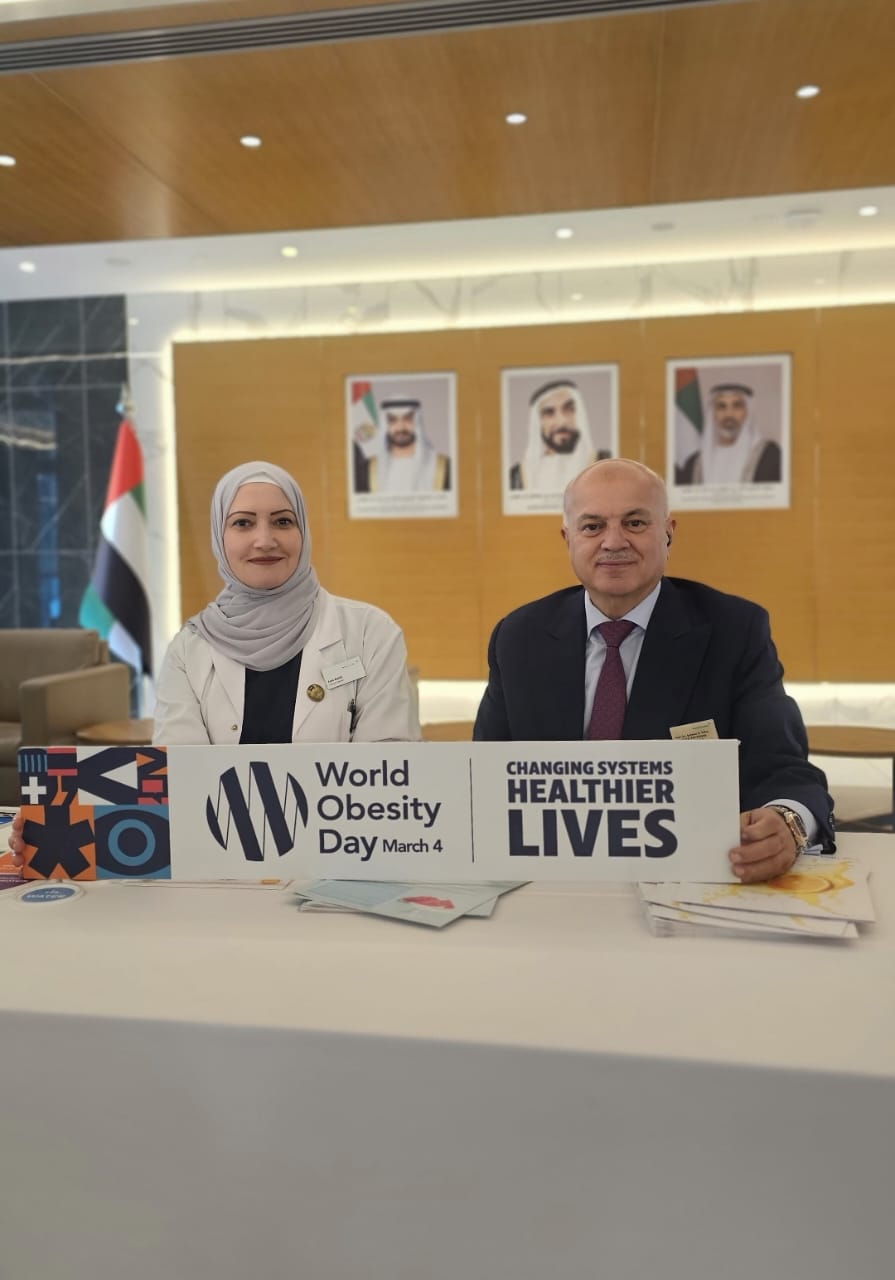القصص

دعونا نتحدث عن... أهمية الحصول على الرعاية الصحية في معالجة السمنة: قصة بريتي
رأي: اليوم العالمي للسمنة يتصور القبول والمساواة في الرعاية
بدأت منظمة "السمنة مهمة" بحلم: إنشاء منظمة يمكن أن تساعد في التوعية بالسمنة وآثارها. أردنا تحدي الوضع الراهن من خلال إظهار كيف يمكن أن تؤثر السمنة علينا جميعاً، بغض النظر عن العمر أو الخلفية.
ولتحقيق هذا الحلم، كان لا بد من تغيير الكثير من الأشياء. أحد هذه التغييرات مستمر في الوقت الذي نعمل فيه على تغيير المنظور العام حول السمنة. ومع ذلك، كان لا بد من حدوث تغييرات أخرى على نطاق أصغر وأكثر شخصية.
قلبت جائحة كوفيد-19 العالم رأسًا على عقب. ولكن بينما جاءت الجائحة مشحونة بالشك والخسارة بالنسبة للكثيرين، إلا أنها أتاحت أيضًا فرصة للبعض لإعادة تقييم وتغيير نظرتهم للعمل والحياة. وهذا ما حدث معي.
مثل العديد من الشركات في العديد من المجالات، تأثر عملي في مجال تنظيم الفعاليات بالجائحة، وتركتني حالة عدم اليقين المتزايدة أشعر بأنني أمام خيارين. إما أن أتخبط في الخوف والشك أو أن أتخذ إجراءً وأشق طريقاً جديداً.
اخترت الخيار الأخير.
كانت المحطة الأولى في طريقي الجديد هي جزر أوكيناوا قبالة الساحل الجنوبي لليابان. لم أتمكن من الوصول إلى هناك شخصيًا (الجائحة وكل شيء)، لكنني اكتشفت شعب أوكيناوا من خلال كتاب "معادلة السعادة" وهو كتاب وبودكاست لنيل باسريشا.
سكان أوكيناوا متميزون لعدة أسباب. فهم يتقدمون في العمر بشكل جيد للغاية، وقلوبهم في حالة جيدة، ويصابون بالسرطان والسكري والأمراض المزمنة الأخرى بمعدل منخفض، وهم سعداء. بالإضافة إلى ذلك، فإن منطقتهم لديها أعلى نسبة من المعمرين في العالم - هناك حوالي 68 شخصًا يبلغون 100 عام أو أكثر لكل 100,000 من سكان أوكيناوا. أما في كندا، فهناك حوالي 26 معمرًا لكل 100,000 شخص.
ويتبع سكان أوكيناوا نظاماً غذائياً غنياً بالكربوهيدرات مع الكثير من الفاكهة والخضروات والدهون الصحية، بينما يستهلكون سعرات حرارية أقل بحوالي 11 في المائة من الاستهلاك الموصى به للبالغين. من الممارسات الثقافية الشائعة لسكان أوكيناوا التوقف عن تناول الطعام عندما يشبعون بنسبة 80 في المائة، ويميلون إلى تناول الطعام من أطباق أصغر.
هذا النظام الغذائي المحدد للغاية قد يفسر جزئياً سبب عيش الناس في هذه المجموعة الصغيرة من الجزر لفترة طويلة جداً، لكنه بالتأكيد ليس الصورة الكاملة.
وبصرف النظر عن فوزهم على ما يبدو بالجائزة الكبرى الوراثية، فإن سكان أوكيناوا يساعدون في قضيتهم من خلال عيشهم أنماط حياة نشطة يعملون في الغالب في الزراعة وصيد الأسماك. كما أنهم يدخنون ويشربون الكحول أقل من معظم السكان الآخرين ويحصلون على الكثير من فيتامين د.
ولعل الأهم من ذلك هو أن سكان أوكيناوا يحافظون على صداقات مدى الحياة من خلال مجتمعات متماسكة. ومن الشائع أن يتم وضع أطفال أوكيناوا في مجموعات اجتماعية وهم أطفال رضع، ويكبرون في نهاية المطاف مع نفس المجموعة من الأقران. ويتميز شعب أوكيناوا بالسعادة، كما أنهم يطورون ارتباطهم بالعالم من حولهم من خلال تنمية شعور عميق بالروحانية والهدف.
كما أنه ليس لديهم كلمة لوصف مفهوم "التقاعد". وبدلاً من ذلك، لديهم كلمة أخرى: Ikigai . في اليابانية، "إيكي" تعني "الحياة"، و"غاي" تصف القيمة أو القيمة. إيكيغاي هو في الأساس مفهوم "سبب الوجود" أو الهدف في الحياة. كان اكتشافي لهذا المفهوم هو ما قادني إلى الخطوة التالية في رحلتي. كنت بحاجة إلى إيجاد الإيكيغاي الخاص بي.
عند التفكير في ما يمكن أن يكون عليه إيكيغاي الخاص بي، أدركت أنني أريد أن أحدث فرقًا بطريقة ما. لقد كنت أعمل في مجال السمنة لفترة من الوقت، ورأيت مدى الوصم الذي يعاني منه المجتمع ومدى حاجة الكثير من الناس إلى منصة ومجموعة من الأفراد الذين يتشاركون نفس التفكير ويتفهمون المعاناة والألم الذي يمكن أن تسببه السمنة.
مسائل السمنة لديها رؤية لتقبل الوزن الزائد
لقد رأيت نقص الرعاية التي كان الناس يتعاملون معها، وحلمت بعالم يُنظر فيه إلى السمنة ويعالجها مثل أي حالة مزمنة أخرى دون وصمة العار. سيكون الطريق طويلاً أمامنا، وسنحتاج إلى تغيير الكثير من وجهات نظر الناس، لكنني شعرت بأنني مستعدة لهذا التحدي.
كان هذا شيئًا كنت شغوفًا به، شيئًا يحتاجه العالم وشيئًا لدي بالفعل بعض المهارات والخبرة فيه. لقد كان هذا الأمر من مقومات الإيكيغاي الخاص بي.
بعد التحدث مع مؤسسي الجمعية في نهاية المطاف، أصبح من الواضح أننا لم نتشارك فقط في التجربة الحياتية، بل أيضًا شغفنا بإحداث تغيير حقيقي. وهكذا ولدت منظمة "السمنة مهمة".
قررنا أن نبدأ مؤسسة غير ربحية برؤية لتقبل الوزن مع البناء على العمل الرائع الذي تقوم به منظمة السمنة الكندية. ستكون الصحة والسعادة أولوية رئيسية، لكن مهمتنا ستكون تثقيف وتمكين هذا المجتمع الدافئ والرائع مع تعزيز معتقداتنا الأساسية.
نحن نؤمن أنه بغض النظر عن حجمك أو شكلك أو إمكانياتك، فإن الجميع يستحقون الرعاية باحترام وتفهم وكرامة. وهذا يعني أيضاً أن الجميع يتمتعون بفرص متساوية في الحصول على العلاجات الطبية والعلاجات أيضاً.
نمت منظمة "السمنة مهمة" من مجرد حلم إلى منظمة غير ربحية ناجحة. لقد تمكنا من توحيد الأفراد والعائلات والمجتمعات المحلية والمنظمات معًا لدعم قضية واحدة مشتركة - خلق الوعي حول السمنة كحالة مزمنة وأهمية الوصول العادل إلى الرعاية.
لقد وصل عملنا الآن إلى الآلاف من الناس في جميع أنحاء كندا وخارجها، ونرى التقدم الذي يتم إحرازه كل يوم مع تزايد عدد الأشخاص الذين أصبحوا على دراية بقضايا السمنة.
نحن فخورون بقائمة إنجازاتنا المتنامية بعد مرور عامين فقط:
مجتمع متنامٍ. نمو مجتمع الأشخاص المصابين بالسمنة وقدرته على التكيف لدعم بعضهم البعض وتغيير نموذج العلاج والسياسات للتركيز على الحلول القائمة على الأدلة بدلاً من الوصم.
التأثير. نحن نتحدى الوضع الراهن ونحرك صناع القرار للنظر في التغييرات. يجب بذل المزيد من الجهود لزيادة المساواة في الحصول على العلاجات والدعم.
الاعتراف الدولي. لقد كان الاعتراف بنا دوليًا بمثابة نعمة لنمونا كمنظمة.
التحالفات. لقد أنشأنا شراكات في قطاعات متنوعة.
مجتمع قوي. كانت مشاركتنا المجتمعية مجزية وتعليمية على حد سواء.
لكن هذه الإنجازات ليست كافية.
وبالنظر إلى المستقبل، فإن حلمي هو العمل مع الأطفال مع تثقيفهم وتمكينهم لتحسين صحة الأجيال القادمة. آمل أن نتمكن في الذكرى الثالثة من تقديم تقرير عن التقدم المحرز في تحقيق هذا الهدف. في هذه الأثناء، هناك عدد من المبادرات والأهداف التي نعمل على تحقيقها، بما في ذلك تغيير السياسات بحيث تكون العلاجات القائمة على الأدلة متاحة لجميع من يحتاج إليها؛ وبحث الشراكات المستقبلية مع المبتكرين، سواء في مجال الطب الافتراضي، أو مع المؤثرين والمشاهير الذين يمكنهم نشر رسالة حب الذات؛ والعمل مع أصحاب المصلحة الذين يمكنهم المساعدة في دحض الأسطورة القائلة بأن السمنة هي مشكلة تتعلق بنمط الحياة ومساعدتنا في تحقيق رؤيتنا لخلق مستقبل من تقبل الوزن؛ ومساعدة الناس على الدفاع عن أنفسهم حتى يتمكنوا من اتخاذ إجراءات للمساعدة في تغيير المواقف المجتمعية.
لا يزال أمامنا طريق طويل لنقطعه في مهمتنا، ولكن التقدم الذي أحرزناه في مثل هذا الوقت القصير يجعلنا متفائلين بقدرتنا على تحقيق أحلامنا الكبيرة.
في اليوم العالمي للبدانة، وفي كل يوم، تلتزم منظمة "السمنة تهمنا" بالمساعدة في خلق عالم لا تعود فيه السمنة مشكلة، ويمكن للجميع أن يعيشوا في صحة وسعادة. هذا هو إكيجاي الجماعي الخاص بنا.
ومع استمرارنا في العمل الجاد والتفاني في العمل، نعلم أن هذا الحلم سيصبح حقيقة في يوم قريب. لنواصل معاً الحلم بمستقبل أكثر صحة.
بريتي تشاولا هي المديرة التنفيذية لمنظمة "السمنة مهمة" ويمكن الاتصال بها على priti@obesity-matters.ca.
نُشر هذا المقال لأول مرة في Healthing في 2 مارس 2023.




